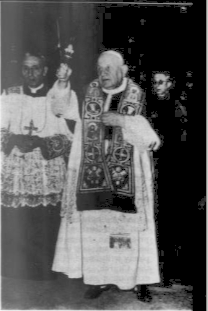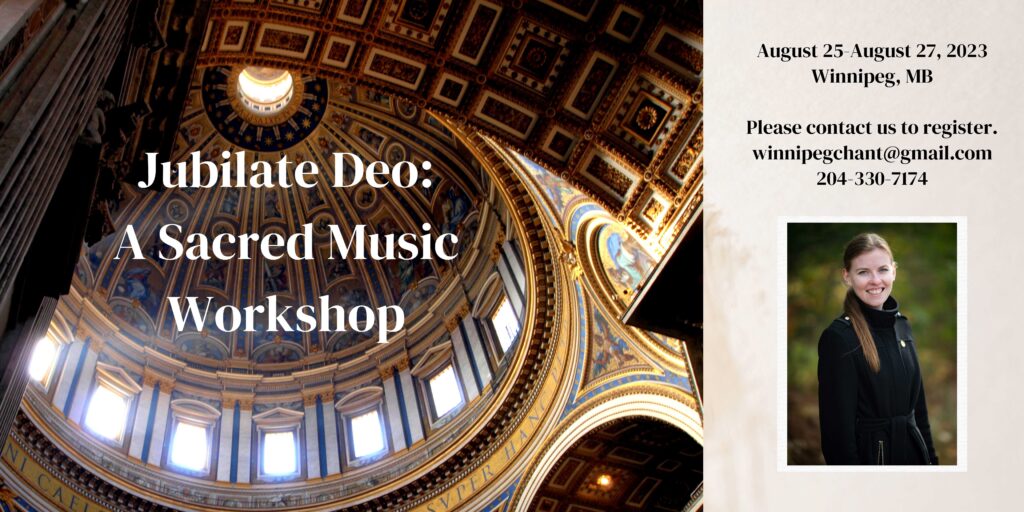At the Blessing of the New Organ in St. Peter’s
An address of Pope St. John XXIII (Monday, September 26, 1962)
[This address was reported in L’Osservatore Romano, September 27, 1962. Italian text (“Nel fervore di questa”.) The translation was prepared by Rev. Austin Vaughan and published in the U.S. quarterly The Pope Speaks (1963, vol. 8, no. 4). The blessing of a new 8,500-pipe organ, installed in the apse of St. Peter’s, was the occasion of the Holy Father’s talk. This organ was built by the Tamburrini Company of Crema, Italy, to accompany the existing organ of similar size installed ten years earlier. Thanks to Adoremus, which published a piece about this allocution some years ago.]
A New Organ for St. Peter’s
Venerable Brethren, beloved sons.
In the midst of the fervor that surrounds us on this eve of the Council, the solemn and joyful liturgical ceremony which we have just concluded – the blessing of the new organ in the Vatican Basilica – was perfectly fitting. It shows how much We have at heart whatever concerns the beauty and splendor of the greatest temple in Christendom; and what pleasure and joy are stirred in Our heart by this expression of beauty and art which enriches it further.
The blessing of an organ is a sacred and memorable event that raises the Christian populace to a lovely and mystical exultation. And today, because the Basilica of St. Peter is concerned, it takes on a new and deeper significance.
Music – most spiritual of the fine arts
Here, in fact, within the majestic walls of the venerable temple that is the focal-point of the devotion and the admiration of the faithful throughout the world, where the vital life of the Church can be seen and falt and where can be found matchless expressions of human genius – here, We say, it is only natural that music – the most spiritual of the fine arts – make its own contribution toward lifting men up to the throne of the Most High, and toward suggesting to them sentiments of adoration, of exultation, of gratitude.
Effects of organ music
“Laudate Dominum in sanctis ejus.” Praise the Lord in His sanctuary. The Christian populace is led to these thresholds by the sound of the organ. Truly it is the king of sacred musical instruments; and as such it belongs to the temple in a very special way, for it is destined solely for the praises of the Lord. As the sacred rites unfold, it becomes spokesman for the feelings of all, for their noblest and holiest flights. Its melodies make it easier for the mystical movements of the sacred event to penetrate into the depths of the soul: admiration of virtue or desire for it, resolutions of penance and mortification, a longing for a more intimate union with God, a pledge to struggle against evil, a foretaste of the happiness of heaven. In this way the soul opens wide to the mystical influences of grace.
Oh, how well St. Augustine recalled these effects in his book of Confessions: “What tears were shed, as I felt myself embracing the heart of the sweet melody of the hymns and canticles that re-echo in Thy Church! What psalm-melodies entered my ears, and truth poured itself into my heart and stirred up the flame of affection, and I wept with consolation.” [1]
Here you have the primary and most obvious significance of this ceremony today; and at this particular time, on the anxious eve of the Ecumenical Council, it takes on added importance.
We can see a gentle touch of Divine Providence in this coincidence.
Symbol and prelude of Christian renewal
It seems to Us that the Vatican Basilica now is offering, in the more powerful sound of its organ, a quite effective symbol and prelude of that renewal of Christian life expected from the ecumenical sessions and taking its beginning from this temple.
Oh yes, the sweet and penetrating sound of the organ can well serve as a symbol of the life-giving breath of the that spirit of the Lord that fills the whole world: spiritus Domini replevit orbem terrarum, et hoc quod continet omnia scientiam habet vocis. [2] Its sound will undoubtedly help the Fathers of the Council feel the solemnity of the historical event; it will help the faithful to hear the rustle of new life that will be spreading through the Church; and it will cause more fervent prayers to well up in hearts – asking God that His Divine Spirit – We are always so happy to repeat this – renew “in our day the wonders of a kind of new Pentecost.” [3]
A second thought suggested by St. Augustine comes to Us which expresses the wonderful function of an organ in the temple of God, and especially in St. Peter’s.
Image of the Church
The Holy Doctor points out how the giving of a proper and ordered harmony to different musical sounds is an image of the well-governed city, where peace and order reign, thanks to the harmonious union of various elements: “diversorum sonorum rationabilis moderatusque concentus concordi varietate compactam bene ordinatae civitatis insinuat unitatem.” [4] How can we but see in this unity amid variety, for which the organ can serve as a symbol, the image of the Church herself with her basic attributes, a living symphony, an image of the heavenly Jerusalem and a kind of echo of the divine harmonies? But here beneath the vault of this temple where the faithful – despite their differences of race, of language, of national origin – still feel themselves more united than ever before as members of a single family, the sound of the new organ blending all their voices into a single chorus will be more than a mere symbol; it will be a living expression and an active principle of the unity of the unity of the Church.
The organ will find in this temple, better than elsewhere and – we might say – more completely, a terrain adapted to its function of guiding and blending into one great melodious spirit all the faithful who lift themselves up to God with their whole heart and call upon Him “una voce dicentes: sanctus.” [5]
We will behold this sight particularly in the days just ahead, when the Pastors of the “plebs christiana,” [6] gathered here for the Ecumenical Council, show themselves to be vivified and to be harmoniously united for the expression of the unity of the faith in all its beauty.
A foretaste of the heavenly liturgy
The organ, as it blends the voices of all into its melodies, will then invite the Christian faithful to form a kind of single harmonious chorus with their bishops and with the priests. The strings of the lyre will be different, but one single symphony will come forth. In this way, the Church, although still a pilgrim upon earth, will show that she is united with the never-ending procession of the Blessed in heaven, who sing hymns in praise of the Spotless Lamb.
Oh what a wonderful sight, an anticipation of and preparation for that heavenly liturgy in which our spirit will be completely satisfied!
With the hope that these wishes and predictions of Ours may be crowned with an abundance of heavenly grace and meet with a loyal response in your hearts, We pour forth in a paternal fashion upon you, Venerable Brethren and beloved sons, and upon all those who have helped to make this possible, the strength and consolation of Our Apostolic Blessing.
[1] St. Augustine, Confessions, Book 9, c. 6.
[2] Wisdom I, 7. “The spirit of the Lord hath filled the whole world; and that which containeth all things hath knowledge of the voice.”
[3] Prayer for the Ecumenical Council.
[4] St. Augustine, The City of God, Book 17.
[5] saying with a single voice: holy.
[6] Christian people.


